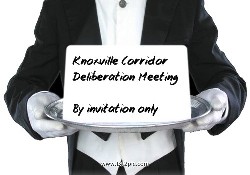The Illinois Attorney General’s office issued the following ruling in a letter dated November 16, 2010:
Dear President Wolfmeyer:
On February 16 and February 18, 2010, this Office received three Requests for Review alleging a violation of the Open Meetings Act (OMA) (5 ILCS 120/1 et-seq.) by the Peoria School District 150 Board of Education. The Requests for Review raise questions whether the Board violated the requirements of OMA when four members of the Board attended a February 16, 2010 event with media and the District’s new Superintendent that was closed to the public.
On February 26, 2010, this Office sent a further inquiry letter to Board of Education President Deborah Wolfmeyer requesting the minutes and the audio recording of the event. On March 12, 2010, School District attorney David Walvoord responded to our further inquiry letter and supplied us with an audio copy of the meeting and a written explanation regarding the event.
In its written response to our letter, Mr. Walvoord confirmed that four members of the District’s seven-member board, including the President and Vice President, were present at the event. Clearly, therefore, more than a majority of a quorum of the Board was present and gathered at that time.
One requester was told by District Spokesperson Stacey Shangraw that the event was open only to “members of the professional press.”
This Office has reviewed the audio CD supplied to us by the District. The event’s timeline follows:
| 2:54- Primary speaker invites questions from the media “for us.”
4:07- In response to a question regarding whether deficits came up in the selection process, the primary speaker states, “I don’t think we got into those kinds of specifics,” and goes on to recount that Lathan shared “with us” an anecdote about a deficit she dealt with in her job with the San Diego school system.
6:00- In response to a question whether Lathan has unanimous support of the board, the primary speaker states “she has the full support of the board.”
13:00- At this point, multiple board members amplify previous answers. At least 3 board members appear to speak interactively at this point.
21:00- The primary speaker notes that “we” are paying for her expenses while she’s here.
23:00- A Board member other than primary speaker makes concluding remarks. |
In his letter, Mr. Walvoord explains that the press conference did not violate OMA because the only comments made by Board members were in response to press questions and that there was no discussion or dialogue among the Board members present.
For purposes of OMA, a “meeting” is defined as a gathering of at least a majority of a quorum of the members of the public body held for the purpose of discussing public business. 5 ILCS 120/1.02. The phrase “discussing public business” refers to an exchange of views and ideas among public body members on a matter or matters germane to the affairs of their public body. It is not directed at casual remarks, but, in effectuation of section 1 of the Act (5 ILCS 120/1), at discussions that are deliberative in nature. A deliberation in this context is a discussion aimed primarily at reaching a decision on a matter of concern to the public body, regardless of whether the discussion will result in the taking of an action, will set policy or is preliminary to either. See, Guide to the Open Meetings Act, at 20 (Rev. 2004).
In this instance, we conclude that although a majority of a quorum of the Board was present at the February 16, 2010 event, the Board members did not engage in a deliberative discussion of public business, and thus, did not violate the Act. Based on our analysis of the audio recording, the comments made by the individual members in response to questions posed by the members of the media did not constitute a deliberative process aimed at setting policy or that could lead to a final decision by the Board. Accordingly, the gathering was not a “meeting,” for purposes of OMA.
Therefore, we find that further action is not warranted.
We would strongly suggest, however, that gatherings of this nature should be discouraged. Clearly, in these circumstances, the gathering of four members of the Board in a venue closed to the public caused serious questions to be raised as to the propriety of the event. Further, although a gathering may not be planned with the intention of discussing public business at its outset, the gathering is subject to conversion to a statutory “meeting” at any point. Thus, a gathering will becomes [sic] a “meeting,” for purposes of the Act, if the attention of the requisite number of public body members present turns to a deliberative discussion of public business, whether or not there was any intent to conduct a “meeting.” Had this occurred in these circumstances, a violation of the OMA would inevitably have happened.
Should you have any questions or would like to discuss this matter, please feel free to contact me at (312) 814-5383. This letter shall sever to close this file.
Sincerely,
Cara Smith
Public Access Counselor
By:
Matthew Rogina
Assistant Public Access Counselor

 The Open Meetings Act (OMA) is hard to follow. Even people like me who want to follow it conscientiously can sometimes find that we’ve inadvertently violated it. So, I just want to acknowledge up front that you really have to be on your toes when it comes to OMA.
The Open Meetings Act (OMA) is hard to follow. Even people like me who want to follow it conscientiously can sometimes find that we’ve inadvertently violated it. So, I just want to acknowledge up front that you really have to be on your toes when it comes to OMA.